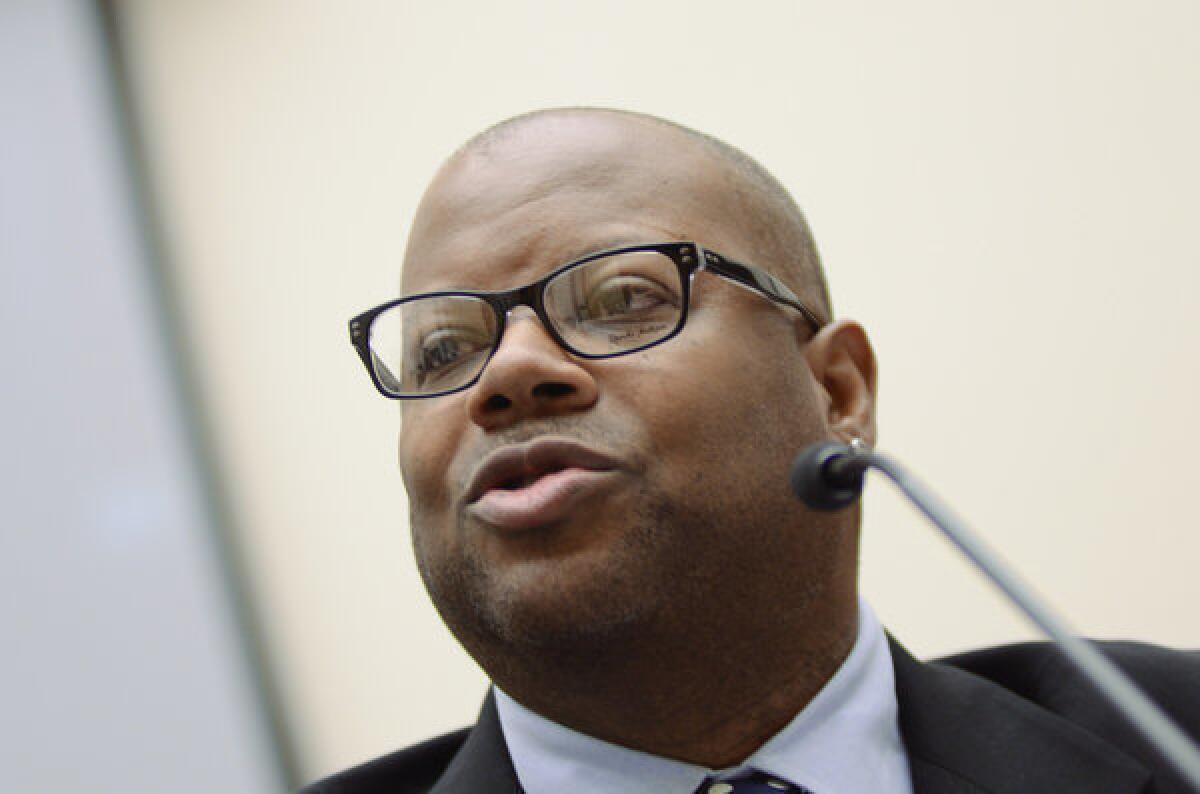Internet Radio Fairness Act debate opens in Washington

- Share via
The jockeying has begun on Capitol Hill over congressional legislation known as the Internet Radio Fairness Act, or IRFA (HR 6480 and S3609), with many musicians, record companies and performing rights organizations lining up in opposition to the bills that are supported by Internet radio operators and other big tech companies such as Google.
Wednesday’s first day of hearings included testimony from producer-songwriter Jimmy Jam, SoundExchange president Michael Huppe, Hubbard Radio President and CEO Bruce Reese, Venrock investment partner (and former eMusic chief) David Pakman, economist Jeffrey Eisenach, and Pandora Radio CEO Joseph Kennedy.
Pakman and Kennedy have lobbied for passage of IRFA, which is sponsored in the House of Representatives by Rep. Jason Chaffetz (R-Utah). It would reduce the royalties that Internet radio operators pay to owners of the sound recordings that are the foundation of their businesses because they claim the fees they are required to pay by the Copyright Royalty Board make their business models unprofitable.
Jam, Huppe and others testified that musicians are already getting the short end of the stick from Internet, satellite and broadcast radio (with the latter paying no royalties for the music they broadcast) and reducing royalty rates, in effect, would add injury to insult.
They were joined in that sentiment by Michigan Rep. John Conyers (D-Mich.), who stated: “A more appropriate [bill] title might be the paycheck reduction act, because what it would do is lower the royalties that Internet radio pays by more than 85%. I want to make a prediction: This bill may well be the catalyst to advancing an AM/FM music performance royalty.”
Jam noted that the majority of musicians are not millionaire superstars, but middle-class artists often struggling to make ends meet. “Their talent is necessary to make the industry work. An artist gets 70 cents per song download, but only a tenth of a penny for a Pandora stream – that’s why the Internet royalty is so high.”
Pakman said his venture firm is staying out of the field “because of the current licensing regime – it virtually prevents success. The failure rate of digital music companies is among the highest of all fields Venrock looks at, making them non-investable businesses.”
Likewise, Hubbard Radio executive Reese said, “The Internet presents an opportunity to expand, but streaming is impeded by high, unaffordable royalty rates. There simply is not enough revenue to cover costs.”
Huppe disagreed, telling the house committee that “a Pandora listener who spends 250 hours with the service costs Pandora only $4 in royalties, and now Pandora wants to lower it further. What would a willing buyer pay a willing seller for this?”
IRFA seeks to reduce compulsory license fees that Internet radio firms pay to the same rate satellite and cable operators pay.
But much of the testimony addressed the long-standing free pass that broadcast radio has enjoyed dating back to the 1940s, a time when radio was considered free promotion for musicians and their record companies.
“Why should one business get to take the intellectual property of another without compensation?” Jam said. “Terrestrial radio doesn’t pay a penny for performances. Congress must close the corporate radio loophole. IRFA is anything but fair, and by all means it is time to hold a conversation about fairness. Fair market royalties should be paid by all platforms.”
On the eve of the hearings, which continue in Washington, a coalition of songwriter groups including the American Society of Composers, Authors and Publishers (ASCAP), Broadcast Music Inc. (BMI), the Society of European Stage Authors and Composers (SESAC) and the Nashville Songwriters Assn. International (NASI) issued a joint letter opposing passage of IRFA.
The bills also are being opposed by conservative think tanks including the American Conservative Union, Citizens Against Government Waste (CAGW), and Taxpayers Protection Alliance, which sent letters outlining their positions to Congress, arguing that the free market, not Congress, should decide what royalty rates are fair.
“While we agree with the basic premise that all [digital radio] services should be treated equally, it should be under market-based standards,” wrote Thomas Schatz, president of the CAGW. “It is imperative that Congress protect intellectual property rights, and allow the free-market to work in pricing negotiations.”
ALSO:
The saddest Christmas songs ever?
It’s beginning to sound a lot like Christmas
Musicians oppose Pandora Radio’s efforts to cut payments
Follow Randy Lewis on Twitter: @RandyLewis2
PHOTOS AND MORE
PHOTOS: Iconic rock guitars and their owners
The Envelope: Awards Insider
PHOTOS: Unfortunately timed pop meltdowns
More to Read
The biggest entertainment stories
Get our big stories about Hollywood, film, television, music, arts, culture and more right in your inbox as soon as they publish.
You may occasionally receive promotional content from the Los Angeles Times.










